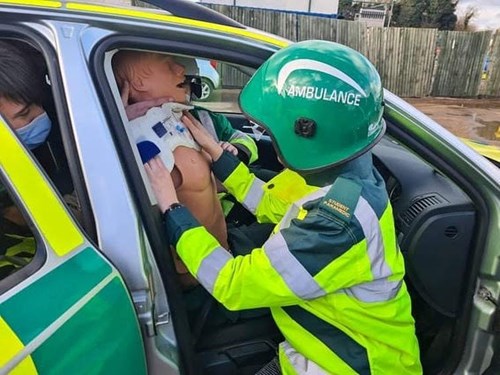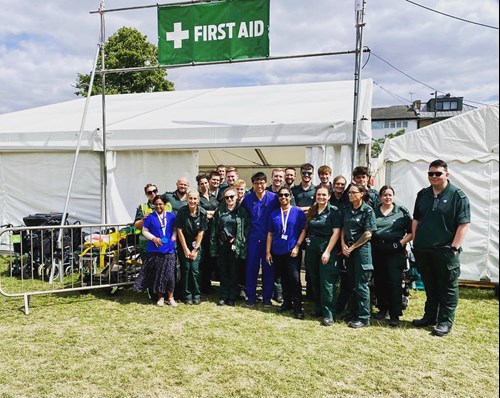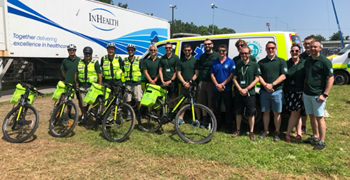30/01/2024
MET Medical: One Broker Ambulance case study
Based in St Albans, Hertfordshire, MET Medical runs an impressive operation. Their UK-wide services include event medical cover, emergency and non-emergency ambulance transfers, and international repatriation.
With such a diverse offering, finding the right Private Ambulance Insurance presented a bit of a challenge. However, MET Medical teamed up with One Broker Ambulance soon after their establishment in 2014 to get just the right cover.
With their 10th anniversary on the horizon, MET Medical has come a long way since their launch, including recovering from a major setback in the form of a devastating fire. To find out more about the business, how they rebuilt after the fire and where they’re going next, we caught up with CEO Dave Hawkins.
How did MET Medical start?
There’s a bit of a story to this!
Many years ago, I was working on a yacht when I got a back injury while the yacht was stationed in Türkiye. I had to be flown back to the UK via air ambulance. This sparked my interest in a new career and I decided to do a paramedic degree. This led to me working in the independent ambulance sector, but I believed that I could do a better job.
I began setting up the business in 2014, which was hectic as I was also pursuing another degree. We began MET Medical with a particular focus on event cover. To do this, we used a lot of paramedic students as they had a great deal more experience and competence than personnel with only a little first aid training.
As we went on, we decided to register with the Care Quality Commission (CQC). This led to us getting NHS work straight away and we began expanding our services.
Today, we’ve got over 100 permanent employees.

What is your most sought-after service?
In terms of the most popular service, we’re quite evenly split between emergency and non-emergency work. We also have a growing portfolio of events, which range from small local gatherings to events with 100,000 people.
We’re quite diverse, but we focus on being really good at what we do. This means that we don’t do tonnes of volume for each service, which gives us quite an interesting business model compared with some of our competitors. I like to think that we’re good at events, but we’re also good at 999 services. I think our uniqueness is in the bespoke element rather than the volume.
What do you enjoy most about working in this sector?
Ultimately, I’m passionate about the patient experience and we’ve done a lot of work on developing that. The CQC are very interested in looking after the patient as a whole rather than just their medical conditions, so we go to a serious level to support that.
Every journey is therefore tailored to our private patients. If it’s a long journey, they get a comfortable mattress, and food and drink that is tailored to their likes and dislikes. If a patient has dementia, we’ll find out their favourite programs and what they used to do for a job so that the crew have something that the patient might remember and can talk about. We’ll also find out if the patient has any hobbies. We recently had a client who liked crossword puzzles and nature programmes, so we got her a crossword book and preloaded a tablet with some BBC nature documentaries. I find it quite exciting to develop the patient experience and get feedback from them and their families.
I also find the regulation of it to be particularly interesting. In an NHS Trust they have a whole team to divide up regulatory responsibility, but here we have a much smaller workforce. The regulatory burden is the same whether you do a few thousand journeys or tens of thousands of journeys, which means we have plenty to do!

What would you say are the current challenges facing the independent ambulance sector?
There’s a lot of pressure from the NHS to reduce costs and it’s sent a lot of large companies into financial difficulty. I therefore think we need to see a change in how things are contracted. At the moment, contracts can cause companies to fight over things and create pay battles, leading to unsustainable wages. Paramedics are also increasingly moving into Urgent Care because the work is so pressured, and this means there is a shrinking pool of people to recruit from.
For these reasons, we’re keeping a diverse business model. We don’t want all of our eggs in one basket because the sector is so volatile. This model supported us during COVID and in times when NHS Trusts have had to pull contracts at very short notice due to budget problems.
How do you find working with One Broker Ambulance?
We’ve worked with One Broker Ambulance almost from the very beginning, which means we’ve been a customer for about a decade! Rob Rowley, the Scheme Director, has been amazing. He’s visited us regularly and he’s put a lot of effort into really learning what we need from our insurance.
Rob always gives me a clear indication of what’s going on in the market and in the insurance sector, explaining where the risk is going. From that, we can make informed decisions about the cover we put in place.
I would absolutely recommend One Broker Ambulance.
Have you had to make a claim? If so, how did One Broker Ambulance help?
Last year, we had a fire and One Broker Ambulance was great in terms of helping us through the claims process.
The fire started in a neighbouring property and crept over to our premises. The wind was blowing the other way, so I thought we were safe, but apparently this creates a sort of swirl effect, so while the smoke was blowing away, underneath it the flames were doing the opposite. It led to our premises being demolished.
We really value Julie Larter from the Claims team. She’s always on the end of the phone and she’s really proactive – she understands us and our business. When you call, you feel as though she is your very own personal Claims Handler and that she is only dealing with you. We couldn’t fault her.
What did you learn following the fire?
The fire made us realise that there were elements that we needed to improve in terms of where our cover was. Often you get asked ‘how much cover do you need?’, and when it comes to things like portable electronics, you tend to just pick a figure out of your head because it’s really hard to calculate, even with the help of a broker. Since the fire, we’ve put systems in place where we can pull out real figures for the headline policies. We realised that this would ensure we had the right cover in the right place but also that we aren’t overinsuring ourselves in other areas.
We’ve also now taken out Business Continuity Insurance. Even though One Broker explained the cover to us in the past, I never thought the business was at risk. Now that we have lost that site and are based in just one place, our risk profile has changed.
We’ve therefore put in 24 months’ turnover protection. This is because the lead time for vehicles can be very long, sometimes more than a year, so if you lose all of your vehicles in the car park you are left in a very difficult position.
What does the future hold for your business?
We’ve got lots of big projects on at the moment. Our focus going forward will be on events and growing the festival market.
We’re also one of the founding members of a new association, the Event Medical Association. This is aimed at improving the quality in the event sector and preparing people for regulation, so we’ll be doing plenty more work on that over the next few years.
Talk to us about Private Ambulance Insurance
If you’d like to discuss the insurance needs of your independent ambulance business or emergency services provider company, get in touch!
Related Articles





